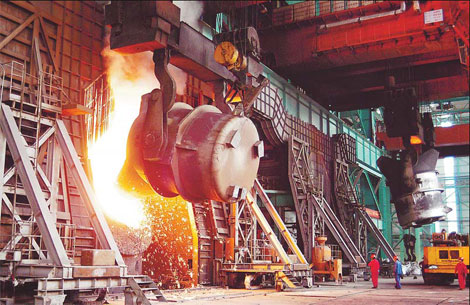Top News
Fortune smiles on Chinese firms
Updated: 2011-07-09 07:59
By Lan Lan (China Daily)
|
Shagang Group's plant in Jiangsu province. The private Chinese steelmaker ranks 366th in the Fortune Global 500 for 2010. Forbes Conrad / Bloomberg |
Country is the second-largest contributor of companies listed
BEIJING - Two private enterprises out of a total of 69 Chinese companies have been listed in the Fortune Global 500 for 2010. Experts said it demonstrates the national economy should be further opened to the private sector by increasing the current policies designed to encourage the private economy.
Boosted by China's rapid economic growth, 15 Chinese companies entered the list for the first time, making the country the second-largest contributor in terms of the number of companies listed, second only to the United States. Of the Chinese companies listed, 61 are located on the mainland.
The two private companies are the manufacturer of telecommunications equipment, Huawei Technologies Co Ltd, which ranks 351th, and the Jiangsu-based steelmaker Shagang Group at 366th.
China has implemented a series of policies to give the private sector access to areas currently dominated by major State-owned companies. But the step should be bolder, analysts said.
China should create a better investment environment for private companies and encourage them to enter the monopolized industries to make them larger and stronger, said Li Zhongmin, an investment research fellow with the Chinese Academy of Social Sciences.
Currently, there are still few private companies in crucial industries such as oil, telecommunications, railways and finance, although the nation has pledged to open the economy to market players of all ownerships.
"Private companies are pillars that can be relied on to improve the nation's international competitive strength, but both State-owned and foreign companies enjoy a more favorable investment environment than the private ones in China," Li said.
The private sector creates more than half of the country's gross domestic product, according to Huang Mengfu, chairman of the All-China Federation of Industry and Commerce. It also accounts for more than 70 percent of jobs nationwide.
Wang Zhile, director of the Research Centre for Transnational Corporations at the Ministry of Commerce, said that the relatively smaller scale of private Chinese companies makes it hard for them to get onto the list because the Fortune rankings simply list the companies by revenue.
The number of Chinese companies on the list has risen for the eighth consecutive year and more will appear in the future, said Wang. However, the list does not necessarily reflect real corporate competitiveness.
"The list only tracks companies' annual revenue, but being a big company doesn't necessarily mean that it will be strong and long-lasting," he said.
Three State-owned companies, China Petrochemical Corporation, or Sinopec, China National Petroleum Corp and the State Grid Corporation of China, joined the top 10.
The US retail giant Wal-Mart Stores Inc is the largest company on the list, followed by Royal Dutch Shell Group and the Exxon Mobil Corporation.
Sinopec, ranked fifth among the top players, is China's largest company by revenue, while Industrial and Commercial Bank of China ranks as the nation's most profitable company.
The four largest banks and two other State-owned companies, China Mobile Ltd and China National Petroleum Corp, were also among the top 50 companies listed.
The increasing number of Chinese companies on the list is a result of the country's robust domestic market, and the appreciation of the yuan has also helped more companies as their revenues are calculated in US dollar, which has been depreciating against the yuan, said economists.
However, compared with international rivals, Chinese enterprises lack experience in managing international operations and integrating global resources, Wang said.
"Chinese companies are better at profiting from the domestic market using domestic resources," Wang said, adding that there's a long way to go before they become truly competitive international players.
The Chinese companies on the list come from 22 industries, mainly in banking, energy and metals, while the US companies are fragmented across 35 sectors.
China Daily
(China Daily 07/09/2011 page9)

Specials

90th anniversary of the CPC
The Party has been leading the country and people to prosperity.

The write stuff
'Pen capital' goes back to drawing board for answers to economic changes taking shape in Zhejiang

Say hello to hi panda
An unusual panda is the rising star in Europe's fashion circles
